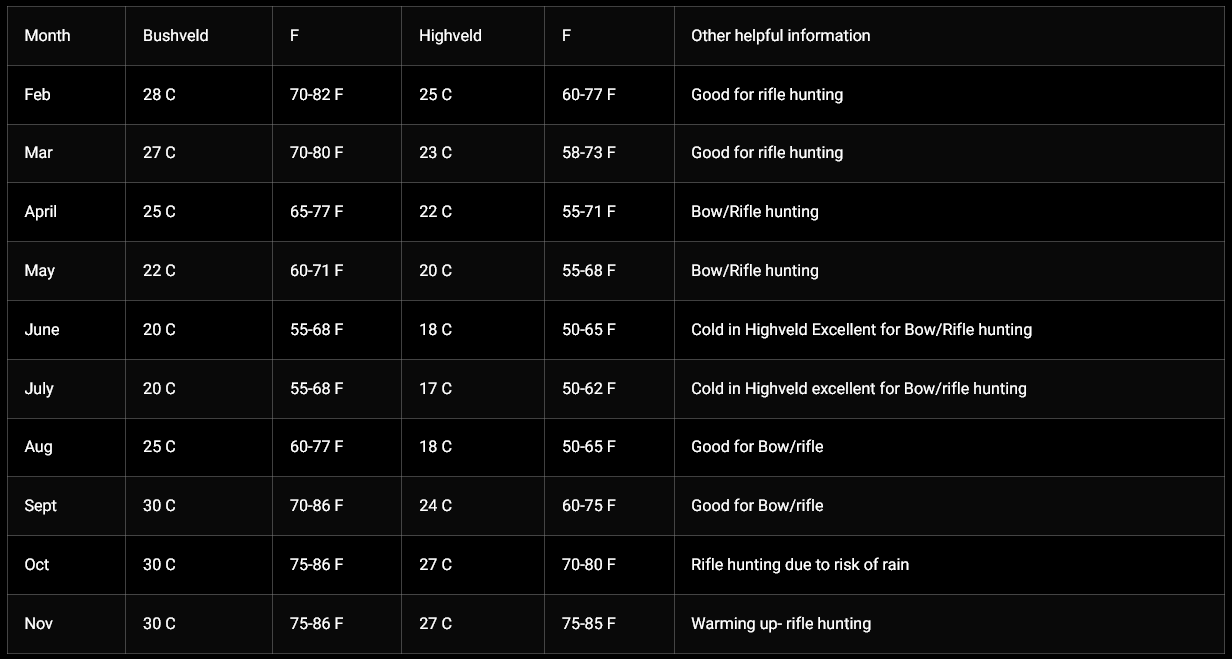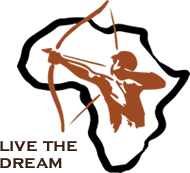FAQ'S
-
What about Transport?
We will pick you up at the airport and take you to the hunting area. You do not have to arrange any transport while you are hunting with us.
-
What is the accomodation like?
Our bungalows, chalets, and lodges are constructed using sandstone or brick, giving them a sturdy, permanent structure. The thatch roof adds to the authentic African atmosphere, creating a cozy and inviting ambiance.
Each room typically includes two single beds with en suite bathrooms that feature hot and cold running water, a shower or bathtub, and flush toilets. We provide all bedding, towels, and bath soap for your comfort and convenience.
Our camps also feature a "boma," which is a seating area under the stars around a campfire, perfect for relaxing and socializing in the evenings. All camps have electricity and a conversion plug (USA to South Africa) is available for your electrical needs, such as charging your camera or laptop.
-
How must ammunition be transported?
To comply with regulations, all ammunition must be packed and transported in a lockable ammo box, which should be placed within your checked luggage. It's important to note that a manufacturer's carton is no longer considered sufficient. Additionally, there's a limit of five kilograms (11 lb) of ammo per passenger, which includes the weight of the ammo box. Don't forget to declare your ammo at check-in.
You have the option to bring your own rifle, following the appropriate firearm import procedures and documentation, or rent a rifle from us at a daily rate of US $25.
When it comes to recommended calibers, for small to medium game, we suggest a minimum caliber of .243 Win. Calibers such as .270, .308, and any of the .300 magnum calibers are excellent all-rounders. For dangerous game, we recommend a minimum of .375 H&H with well-constructed bullets.
Expect bushveld shots to range between 20 and 150 yards, usually through bushes. Highveld shots, on the other hand, will be on the open plains of the Free State and can range from 50 to 300 yards.
-
How to import my firearm?
Renting a rifle from us is a hassle-free option at just US$ 25. Simply inform us in advance, and we will arrange it for you. However, if you prefer to bring your own rifle, please refer to the firearm import instructions on our website.
You will also need to obtain a manufacturer's or police letter to verify the ownership of your rifle. It is essential to have this letter stamped when going through US customs. For further details, visit www.phasa.co.za, and don't forget to check with your airline.
-
Best shot placement on African animals?
We suggest purchasing the book "The Perfect Shot: Mini Edition for Africa" by Kevin Robertson, available at Cabelas, Outdoor Warehouse, Sportsmans Warehouse, Bass Pro Shop, or online through Safari Press. In addition to North American animals, it provides guidance on shooting African animals on the shoulder when taking a broadside shot, and on the opposite front leg when quartering away. Your Professional Hunter will also review this information before the hunt.
-
Bow set up?
Bow setup women/kids
38 pounds and up
380 gr arrow with a well-constructed two-blade broadhead like a kudu point or iron will broadhead.
Bow and arrow setup for Plains game.
Any 400 gr+ arrows.
A well-constructed fixed blade or mechanical broadhead will suffice. Make sure your bow is tuned with this setup.
Big game bow and arrow including giraffe & buffalo etc.
A 720gr + arrow with a minimum of 70 pounds draw weight.
Use a fixed blade broadhead like iron will, kudu, or Alaskan
-
Explain bow hunting/blinds shot distance?
When it comes to bow hunting, there are two main methods used: hunting from permanent blinds or pop-up blinds, and walk-and-stalk hunting. If you choose to hunt from a blind, your shot will typically be set up between 15-30 yards.
Our permanent elevated blinds offer enough space for at least two people and are suitable for video recording. This is a great option for first-time hunters or those who prefer a more stationary approach. However, if you prefer to stalk your prey, you must be able to shoot accurately up to 60 yards. We recommend bringing full camouflage clothing, including a ghillie suit, scent-blocking gear, and sturdy walking boots.
-
Where are the hunting areas?
Different species of animals are found in specific areas. The Bushveld and the Highveld are the primary hunting areas for plains game, with big game hunts available in other parts of South Africa upon request. The Bushveld is suitable for both bow and rifle hunting, while the Highveld is best for rifle hunting. See below for more information on the two areas.
The Bushveld:
The Bushveld is located in the Limpopo province, around a 3-4 hour drive north of Johannesburg airport and close to the Botswana border. This area is characterized by warm and dry weather, grasslands filled with acacia trees, and thorn bushes. The Bushveld is around 2000ft above sea level, and it is a great area for both bow and rifle hunting. Check the price list for the list of available animals in the Bushveld.
The Highveld:
The Highveld is located in the Free State and is around 2.5-3 hours' drive South, South-East from the airport. The area has cooler weather than the Bushveld and is characterized by open grass plains with high mountains. It is best suited for rifle hunting, and the altitude here ranges between 4000-6000ft above sea level. Check the price list for the list of available animals in the Highveld.
-
What about Taxidermy?
We highly recommend using the services of the taxidermist we work with in Johannesburg, South Africa. The Highveld taxidermists are renowned for their expertise in African animal taxidermy.
To learn more about their services, please visit their website at www.highveldtaxidermists.com or send an email to info@highveldtaxidermists.com. We would also be happy to take you to their workshop and show you their work. If you prefer, we can also arrange for your trophies to be dipped and shipped, so that you can have them mounted by your preferred taxidermist.
Please note that taxidermy work is not included in any of our pricing and is completely optional.
-
Payment for hunt
A non-refundable deposit of US$ 500 will confirm your booking. You can either do an electronic transfer or pay per credit card.
Swift details for direct transfer to our Bank Account
ACCOUNT NAME
African Barefoot Safaris
BANK NAME
FirstRand Bank Ltd
ACCOUNT TYPE
Business check account
ACCOUNT NUMBER
6300 894 0298
BRANCH/ROUTING
250655
IBAN/SWIFT
FIRNZAJJ
Bank physical address
FirstRand Bank LTD
4 Merchant Place
Sandton
South Africa
2031
Account holder address
Farm Pieterman
LR445
MARKEN
South- Africa
0605
Please state your name address and the reason for the payment eg: Hunt Deposit or Daily rate payment
You can also pay your deposit with your credit card. Follow the Booksure link under Booking in the main menu. We accept MasterCard and VISA
To settle your outstanding account you can pay with a traveler’s cheque, credit card (MasterCard or VISA), or cash (US Dollar or Rand).
You can also build up your fund by paying a monthly amount into our account before arrival to cover the cost of the hunt.
The package hunts include two people hunting for 10 days and 4 trophies. Only additional animals will be added to the bill. Pay per animal is your daily rates, trophy fees, travel fees, and arrival night accommodation costs.
Gratuities are at your own discretion, we recommend a minimum of $50- for kitchen and laundry staff as well as skinners and trackers. We recommend that you tip your guide 10 % of your bill, but once again, this is at your own discretion.
A small cash amount is handy for curio shopping, but most shops accept credit cards and even US dollars.
-
What will we eat and drink
Complimentary soft drinks, fruit juice, drinking water, milk, iced tea, tea, and coffee are provided. In addition, beer, wine, and Amarula (South African liquor) are served around the campfire or as a nightcap. Any additional liquor can be requested.
A Typical Daily Menu:
Breakfast:
An English breakfast includes eggs, bacon/sausage, toast/muffins/french toast, fresh fruit, cereal, and yogurt.
Lunch:
For bow hunters, a lunch pack consisting of sandwiches, salad of the day, snacks, fruit, sodas, and water. For rifle hunters or those returning to camp midday, lunch includes different salads with cold meats, bread/soups with fresh bread, macaroni and cheese, burgers and fries, etc.
Dinner:
A salad of the day, which can include lettuce, tomato, spring onion, olives, feta cheese, carrots, corn, etc. The main course usually consists of venison with chicken/pork/beef. One starch such as potatoes, rice, or "pap"/grits and two/three fresh vegetables like broccoli, carrots, asparagus, corn, gem squash, spinach, cauliflower, etc. Dessert is served after dinner.
Please inform us of any food allergies or special dietary requirements in advance, so we can purchase the appropriate food.
-
What about electricity?
South Africa's electricity operates at 220 volts, which differs from the 110 volts used in the United States. To ensure that your US electronic devices can be charged during your stay, we have adapter plugs available to convert the plugs to the South African standard. However, please note that hairdryers must be compatible with 220 volts.
-
What about Passports and Inoculations?
To enter South Africa, a valid passport is required, except for those coming from Mexico who need a visa. While no vaccinations are mandatory, it is recommended to take Malaria prophylactics when hunting certain areas such as Zululand or the Lowveld, or when visiting Kruger Park. It's best to consult with your doctor to get proper medical advice.
It's also advisable to pack a small personal/general medicine kit, although we do have a first aid box in camp, and there are excellent private hospitals and doctors in town. Make sure to check with your medical insurance provider in advance to know your coverage options.
-
How to get started?
To finalize your hunting trip, follow these steps:
- Secure your booking with a non-refundable deposit.
- Book your airline ticket. If you need assistance, contact www.travelstart.com or melanied@premiertours.com, which is located in the States.
- If applicable, complete your firearm import documents.
- Purchase "The Perfect Shot: Mini Edition for Africa" by Kevin Robertson Safari Press, which is available at Cabelas, Outdoorwarehouse, Sportsmans Warehouse, and Bass Pro Shop. Practice shooting.
- Notify your bank and insurance company of your upcoming trip.
- Submit your booking contract and indemnity form to us.
Temperature / Hunting Season / Full Moon

